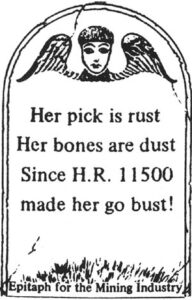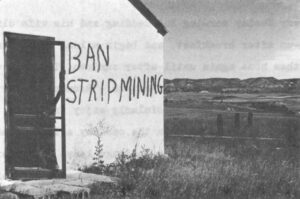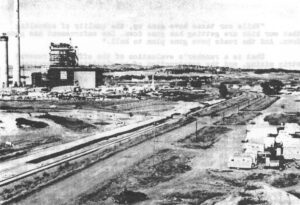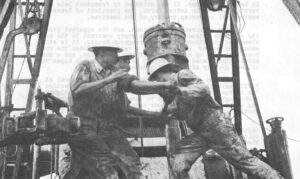Houston’s Shamrock Hilton Hotel is part of the city’s on-going construction boom, built in part to accommodate traffic between Houston and every oil-producing nation in the world. Here President Ford chose to attack Congress for taking a “reckless gamble” by opposing his plan to conserve energy by taxing imported oil, before a select audience of prominent businessmen all involved in some way in hydrocarbons. The meeting was arranged by the Chamber of Commerce of what has become the oil capital of America, and it reflected the intimacy and commonality of purpose of an industry conference.
“Personally, I am very sensitive to the dramatic cost increases in domestic oil and gas exploration and development…. In the last twelve to eighteen months, the costs of drilling a well have gone up one hundred per cent, or more. With these facts in mind, I think we have to understand the need for incentives….
“I think it would be a very serious mistake not to make maximum use of the marketplace to achieve our national goals. There is no doubt in my judgment it offers the best and most equitable solution. The promised land of allocation and rationing would turn out to be a jungle of red tape….
“If we got into gasoline rationing — over my dead body — then we would have some 140 million licensed automobile drivers in the United States, and we have some 290 million gallons of gasoline a day. What does that amount to, if you just divide it equitably? Not many people in this country — and very few in Texas — can go very far in their daily chores or their work on about a gallon and three-quarters a day.”
The President’s comments about incentives in the marketplace drew the loudest applause. Some of the men present did not approve of Ford’s proposal to impose a one-dollar a barrel tariff on oil, but were far more interested in his suggestion that federal regulation of the price of natural gas be done away with.
“Our energy difficulties involve much more than oil,” Ford said. “One of our most important energy sources, and the most acceptable from an environmental point of view, is natural gas. Despite the pluses of natural gas…prices were held to artificially low levels. Real prices for natural gas fell throughout the 1960s. Demand for natural gas doubled between 1957 and 1972. Not surprisingly, the rate of exploration and development on new gas fields dropped off….
“Unless our natural gas policy is changed by congressional action, we will be faced in a short time with hard choices on supplying either homes or industries across the nation. And in this bill that I put together with the help and assistance of my White House and departmental aides, we have a proposal for the de-regulation of natural gas. Right now, because of natural gas shortages, I have read horror stories of factory closings and lost jobs.”
The de-regulation of the price of natural gas has been a prime issue in Texas — and among the nation’s oilmen in general — for more than twenty years. Such a bill was passed by Congress in 1956, under the auspices of Senator Lyndon Johnson, after one of the most intensive lobbying efforts ever. President Eisenhower, sympathetic to the oilmen, was forced to veto the bill because it was revealed publicly that a bribe had been offered to Senator Francis Case, to win his support for the bill.
Ironically, one of the men who led the 1956 lobbying effort for the natural gas bill was among those listening to President Ford’s speech at the Shamrock Hilton. John Connally was an employee of oil independent Sid Richardson in 1956, and although not registered as a lobbyist in Washington, he performed those duties.
Connally met alone with President Ford for forty-five minutes, following a meeting the President held with top Republican leaders from Texas at the Shamrock. The President’s chief political advisor, Robert T. Hartmann, later claimed that the President didn’t plan to meet alone with Connally, and only did so because “Connally just hung-around and the rest left.”
Not only is Connally under indictment for accepting a bribe, committing perjury, and conspiring to obstruct justice in a case involving milk producers, but he is also a senior partner in one of the largest law firms in America, Vinson, Elkins, Searls, Connally and Smith. It is one of the big three Houston firms competing with their counterparts in Washington and New York in matters of simple influence peddling.
These big firms have grown up with the oil industry in Houston, and have greatly contributed to the city’s preeminence as an oil center, and as a growing force in American foreign policy. The Houston skyline is a tribute to oil: the towering Exxon Building, on top of which rests the prestigious Petroleum Club, the Gulf Building, the two Shell Plazas, the big banks that house the law firms. South of Houston lies the largest petrochemical center in the world. The city itself is a stark and vibrant citadel of downstream production — refining, manufacturing, research, and all the attendant services of the industry.
President Ford’s spokesman said Connally and the President had not discussed Connally’s indictment, but had talked about energy and economic matters. One topic they may have discussed is the proposal to bring natural gas to the United States from Russia, a program that would run for twenty-five years, and cost several billion dollars. Connally’s law firm represents some of the companies involved in the proposal — which requires federal funds — including Texas Eastern Transmission, and Brown and Root, the mammoth construction firm that provided money for the political careers of both Connally and Lyndon Johnson.
The speeches given by other members of the administration at the Shamrock, including Interior Secretary Rogers C. B. Morton, echoed the President’s sentiments regarding market incentives. Morton said that if the oil depletion allowance is repealed, then a windfall profits tax against the major companies would probably not be appropriate.
Ford ended his speech by pointing out that “one of the fundamental principles is that decision, direction, and deed do not come down from rules and regulations and bureaucratic paperwork, but up from the millions of its citizens.”
A White House official who asked not to be identified suggested after the meeting that the President’s proposal for a tariff on imported oil was primarily a political ploy. Ford never expected Congress to accept the proposal, the official said, and was using the opposition for two reasons. One was to provide him the excuse to take an urgent message to the people — to lobby, in effect — regarding the necessity to conserve energy. The second was to unify Congress, even if in opposition, and force it to concentrate on a pressing and complicated matter.
“At least.” said the official, “the President has made Congress look hard at energy. He was a Congressman for twenty-five years, and he knows how hard it is to keep Congress interested in any one problem for an extended period of time, without giving way first to one group, and then to another.”
So far that is all Ford’s proposal has accomplished. What compromises arise remains to be seen.
Received in New York on February 20,1975
©1975 James Conaway
James Conaway, a freelance writer, is an Alicia Patterson Foundation award winner. This article may be published with credit to Mr. Conaway and the Alicia Patterson Foundation.




